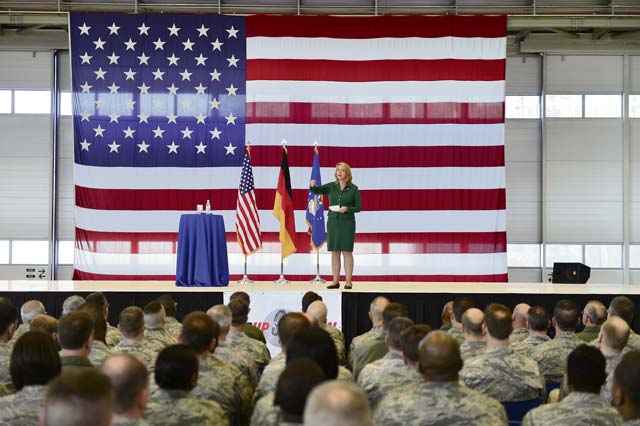
Secretary of the Air Force Deborah Lee James shares her top three priorities, Air Force challenges and the way ahead at an Airmen’s call Monday on Ramstein.
For her first stop during her first overseas trip, Secretary of the Air Force Deborah Lee James toured Ramstein and spoke with U.S. Air Forces in Europe and Air Forces Africa Airmen Monday.
The purpose of the trip for the 23rd secretary of the Air Force was to give her a chance to learn more about USAFE-AFAFRICA’s role in the region, meet Airmen in their work stations and better understand Ramstein’s many mission capabilities through face-to-face interactions.
Her visit consisted of a command mission brief, one-on-one discussions during lunch with Airmen, facility tours, a meeting with Ramstein sexual assault response coordinators, and C-17 Globemaster III and C-130J Super Hercules aeromedical evacuation static displays. She finished up with an Airmen’s call open to all Ramstein personnel.
During the Airmen’s call, James spoke about her top three priorities, challenges the Air Force is facing and the way ahead for the force. She explained her three priorities were taking care of people, balancing today’s readiness with tomorrow’s modernization and making every dollar count.
“To me, taking care of people means we need to continue to recruit the right people. We need to retain the right people and shape the force by having the right people in the right ranks and specialties,” James said. “We also need to be able to grow and train leaders while encouraging diversity of thought.”
James also said that by invigorating the discussion of the Air Force core values, Airmen can ensure they are taking care of each other by having dignity and respect for all.
Explaining her second and third priorities, she said since the period of sequestration, activities surrounding our readiness, like flying hours and TDYs for professional development, have slipped.
“Readiness needs to be brought back up to a more reasonable level, but we still need to ensure we are adding value to every tax dollar,” she said.
Some of the challenges James discussed included the continuous budget constraints and the delicate, yet complex solutions Airmen will be faced with throughout the next few years.
In order to sustain readiness and build technological superiority, James said the Air Force is reducing manpower and force structure, retiring outdated aircraft, such as the A-10 Thunderbolt II, the U-2 Dragon Lady and the MQ-1 Predator, as well as slowing the growth of military pay.
“We need to invest the money we save from these reductions and use it for near-term readiness,” she said. “We will be using these savings to invest in flying hours, training and modernization platforms like the (long range strike) bomber and space programs.
“We will also be force shaping to create a smaller Air Force,” James continued. “We hope to have as many people as possible separate voluntary, but we will be involuntary separating Airmen if needed. We project there will be two boards throughout the next 15 months or so, and if someone goes through the first board, they will not have to go through a second time.”
The last subject James elaborated on was the reduction of compensation.
“The proposal going forward in fiscal year 2015 will slow the growth in military compensation,” she said. “Instead of a 2 percent pay raise, there will be a 1 percent, so the pay still goes up, just not as much.”
The secretary also asked Airmen to ensure they are constantly reviewing and updating their records, communicating with their supervisors and seeking information from their leaders as things continue to change. Airmen should also be prepared for their future, wherever it may take them.
James has 30 years of senior homeland and national security experience in the federal government and the private sector. Prior to her current position, she served as president of Science Applications International Corporation’s Technical and Engineering Sector, where she was responsible for 8,700 employees and more than $2 billion in revenue.


